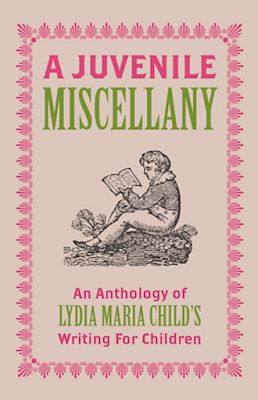"This splendid anthology of Lydia Maria Child’s writings for juveniles is a major publishing event that represents American Studies at its best. The product of an inspiring collaboration between the scholarly editors and their students in the field, the book reprints for the first time a wide range of texts covering all the subjects about which Child sought to educate her youthful readers—relations between indigenous peoples and white settlers; race, enslavement, and abolition; history and revolution; the natural world; and work, wealth, and poverty. The anthology’s superb introduction not only highlights Child‘s role in creating an American children’s literature and influencing later practitioners of the genre but offers insightful interpretations of key texts. Altogether a remarkable achievement."
Carolyn L. Karcher, author The First Woman in the Republic: A Cultural Biography of Lydia Maria Child
"A Juvenile Miscellany, a beautifully edited collection of Lydia Maria Child's children's literature, is a joy to read. The selected stories are lively and evocative; together, they provide irrefutable evidence of Child's genius as a pioneering American children's author. The editors' introduction contextualizes the stories in Child's wider career as a radical abolitionist and reformer, confirming her status as a major nineteenth-century intellectual with much still to teach us today. "
Lydia Moland, author of Lydia Maria Child: A Radical American Life
"A Juvenile Miscellany: An Anthology of Lydia Maria Child’s Writing for Children is a milestone in the author’s recovery. Offering an abundant selection of the author’s work on various social justice causes, as well as key texts on the natural world, this generous collection represents Child brilliantly as an activist and a citizen. It is exactly the book I have been wanting."
Karen Kilcup, Elizabeth Rosenthal Excellence Professor at UNC Greensboro and author of Stronger, Truer, Bolder: American Children's Writing, Nature, and the Environment
And we were interviewed for the Lydia Maria Child Newsletter - some screenshots here!
Full description below!
Author and activist Lydia Maria Child was a foundational figure in the development of American literature in the early nineteenth century. After her debut novel Hobomok (1824) challenged readers with its representation of interracial marriage, she continued to blaze literary trails for the rest of her life, developing a loyal readership as she confronted the most pressing issues in American life. She wrote novels, poems and short stories, composed housekeeping and parenting manuals, edited abolitionist newspapers and narratives—most notably Harriet Jacobs' Incidents in the Life of a Slave Girl (1861). Less well-known is that she almost single-handedly invented a new American literature for children. For decades, and particularly during her time at the helm of groundbreaking children’s magazine The Juvenile Miscellany (1826-1834), Child was a constant companion for young readers across the world.
For the first time, this anthology brings together a career-spanning collection of Child’s writing for children which demonstrates the extraordinary richness and range of her vital work in this field. As she shaped the idea of what children’s literature could be and do, Child trusted her young readers to understand difficult questions of social and racial justice, explorations of natural and national history, sentimental domestic sketches, and much more besides. Contemporary readers can now rediscover the delight that the arrival of a new issue of The Juvenile Miscellany brought to the world while grappling critically with the ongoing resonance of these questions in the twenty-first century.




No comments:
Post a Comment